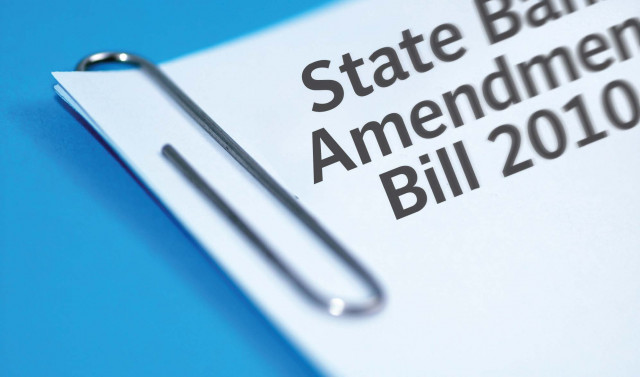‘Toothless’ State Bank Amendment Bill approved
Window of inflationary government borrowing from SBP remains open.

The government and the Pakistan Muslim League-Nawaz (PML-N) on Thursday made nexus to deny autonomy to the central bank as they approved apparently a toothless State Bank Amendment Bill in a Senate panel meeting, killing the motive of bringing amendments to the original act.
The approval of the State Bank Amendment Bill 2010 was made possible only after Finance Minister Dr Abdul Hafeez Shaikh held a meeting with Senator Ishaq Dar of PML-N in the Punjab House on Thursday morning. Shaikh surrendered to PML-N’s demands of retaining the Ministry of Finance monopoly over the central bank and keeping the window of inflationary borrowing open. After the understanding between the shadow and incumbent finance ministers, the Senate Standing Committee on Finance unanimously approved the bill by incorporating the proposed amendments.
Dar had blasted the proposed amendment bill in the last meeting of the committee and said the government wanted a state within a state by giving autonomy to the central bank, which would make it difficult for the government to carry out financial operations.
The International Monetary Fund’s (IMF) reaction to the toothless bill is yet to be seen. IMF has been pushing Pakistan to give autonomy to the central bank after realising that reckless federal government borrowing has become a main cause of inflation, hurting mainly the poor. Approval of the amendment bill is one of IMF’s conditions prior to the start of fifth review talks early next month.
The bill will now go back to the National Assembly for approval with Senate amendments. In case the National Assembly raises objections over the Senate amendments in the already-approved draft, the president will convene a joint session of parliament.
The proposed act had imposed a major restriction on the elected governments, saying they would restrict their borrowing from the State Bank of Pakistan to only 10 per cent of their last year’s total revenues. However, the amendment incorporated by the Senate body has deleted this clause from the proposed legislation, and the federal government will now be allowed to borrow from the central bank according to the desire and will be required to repay such loans by the end of each quarter of the fiscal year. In case the government fails to repay the borrowed amount to the central bank at the end of each quarter, it will be required to explain reasons for default to parliament.
Incorporating another amendment, the government will now repay Rs1.29 trillion loans in eight years, which it has obtained to finance the budget deficit. Earlier, the bill passed by the National Assembly had bound the government to return the money in five years. The committee was of the opinion that it would be difficult for the government to repay the loan within five years.
According to the major amendments approved in the proposed State Bank Amendment Bill 2010, the proposal of constitution of Monetary Policy Committee has been omitted from the draft legislation. It has, however, been proposed that the existing Fiscal and Monetary Policy Coordination Board will be retained, with the central bank finalising monetary and credit policies in consultation with this board. The membership of the Fiscal and Monetary Policy Coordination Board will be increased from existing five to seven, with finance minister as its chairman.
Members of the committee were of the view that during the last four years, the Fiscal and Monetary Policy Coordination Board has not been able to meet and guide the central bank on monetary policy, which has resulted in flawed policy-making.
“The autonomy enjoyed by the State Bank in the last four years in terms of monetary policy-making has proven that it was not according to the ground realities and was against the objectives of fiscal policies, which led to high inflation and low growth,” said Senator Haroon Akhtar.
State Bank of Pakistan Governor Dr Shahid Kardar insisted that even after incorporating new amendments, the approved draft still ensured central bank autonomy.
Published in The Express Tribune, April 29th, 2011.



















COMMENTS
Comments are moderated and generally will be posted if they are on-topic and not abusive.
For more information, please see our Comments FAQ